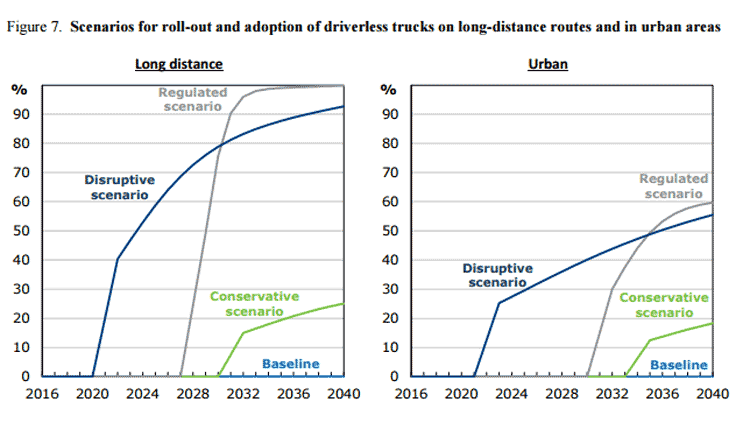As many as 50-70% of truck driving jobs in the US and Europe could be lost by just 2030 due the rapid introduction of autonomous trucks into the market, a new report from the International Transport Forum.
Supply Chain Digest Says... |
|
|
At the upper end of that range, some 4.4 million out of a total of 6.4 million driver positions could be eliminate, the report finds.
Of course, no one knows for sure how this is going to play out, and there are certainly many regulatory and operational hurdles to cross before driverless trucks dominate the freight transport scene.
Still, billions are being spent on the technology, with news just last week that the Alphabet company's (parent of Google) self-driving car unit Waymo is also working on developing self-driving truck. The report notes that semi-automated driving, such as platooning technology in which perhaps three trucks with drivers are connected and can move much more efficiently automated acceleration and braking, are likely to serve as bridge technologies between today and full automation later.
There are also great potential financial benefits to carriers and shippers from a move to driveless trucks. The report notes that labor still accounts for 35 to 45% of total costs in the road haulage sector in Europe. Similarly, in the US, driver wages and benefits account for an estimated 35% of marginal (per mile) costs of freight operations, the report finds. Driverless trucks likely would also reduce fuel costs through more efficient operation of the trucks.
Those potential labor and fuel savings from with an incremental cost of only about 5% more for a truck equipped with driverless technology versus a standard rig.
The report lays out three scenarios for both long-haul and more urban freight environments, with different percentages of the amount of freight moved by autonomous trucks in each. As can be seen below, under two of the three scenarios, virtually 100% of long-haul freight is moved by driverless trucks by 2040. Under the most conservative scenario, that share falls to just 25% over the same period. The numbers are far lower for urban deliveries, but two of the three scenarios still see autonomous trucks gaining nearly a 60% share over the next couple of decades.

Source: International Transport Forum
Obviously, the impact on the number of driver positions lost is directly tied to which scenario plays out.
(See More Below)
|
CATEGORY SPONSOR: SOFTEON |
|
|
| |
|
|
The report notes that this technology is developing during a period when there are real issues with a shortage of truck drivers in Europe, the US, and indeed other parts of the world. The US is said by some observers to potentially be headed for a shortage of hundreds of thousands of drivers in the next few years if the economy strengthens.
If they work, autonomous trucks obviously would solve that problem. The report, however, raises concerns that under some of its scenarios, the loss of jobs will be too rapid, leaving drivers and society not enough time to adjust and massive unemployment, considering that millions today make a living in the US and Europe moving freight.
The report also raises the interesting question if whether the prospect of driverless trucks will in the short term exacerbate the driver shortage issue, as fewer drivers enter the profession in the face of dismal long-term prospects but before autonomous technology is ready for prime time.
The report in the end recommends the formation of advisory boards to look at the issues, but more interestingly suggests governments consider a temporary use of a permitting system for driverless truck deployment. In other words, the roll out of autonomous trucks would be metered by governments to slow the transition in a way that manages the social impact more gradually.
The full, interesting report is available here: Managing the Transition to Driverless Roadfreight Transport
How fast do you believe driverless truck technology is likely to be adopted? How should the impact on jobs be handled? Let us know your thoughts at the Feedback section below.
Your Comments/Feedback
|
|
John Durgavich
Technical Advisor, John Snow, Inc. |
Posted on: Jun, 13 2017 |
|
| I would think the type of road would be an important consideration as to whether to employ automation. At the moment, I can't see an automated truck outperforming a driver on the Pennsylvania turnpike on a winter's night. Too many gear changes, poor long-range view of the road, plus moving and stationary obstacles -and what happens if a load shifts?. Similarly in an urban setting with lots of moving obstacles and starts and stops... call me old fashioned, but I'd prefer a driver behind the wheel. On the other hand, the long, flat cross country hauls where there's no competing rail could get a lot cheaper... I'm not in love with the idea, but I can understand how it could be attractive to some. It is certainly tech to keep an eye out for. |
|
C. Michael DePew
President, CMD Trailer Sales & Leasing, Inc. |
Posted on: Jun, 13 2017 |
|
This will come quicker than any one could imagine. It solves more issues than it creates. There will local drivers and yard drivers to stage loads.
They could run at night to reduce congestion. Efficiencies can increase because most variables will be managed.
How big does a truck need to be if there is no driver?
Speed, horsepower, time in transit can all be managed based on costs vs. time. The moving warehouse can arrive only when it is needed. |
|
|